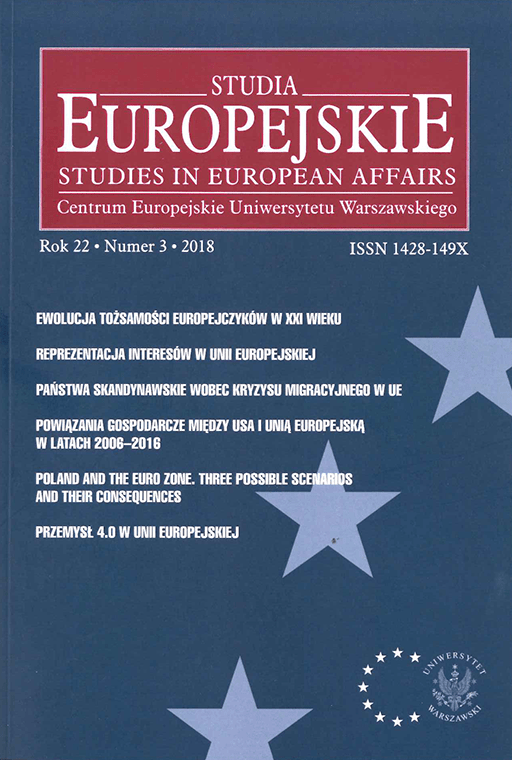
ISSUE: 3/2018
- Volume 22
- Number 3
- 2018
Subscribe NEWSLETTER
Studia Europejskie –
Studies in European Affairs
ISSN: 1428-149X
e-ISSN: 2719-3780
License
Articles published in the journal are under a Creative Commons Attribution – Non Commercial – No Derivatives 4.0 International License
Dzieci imigrantów – sytuacja prawna i społeczna
Children of Immigrants – Legal and Social Situation
Abstract
Migrations have accompanied mankind for hundreds of years. Wandering for livelihood has been and is inscribed in historical and social processes taking place on a regional and global scale. Decisions on change of residence usually are on economic grounds, but they can also be political, religious, social or related to the climate. They are taken by adults, but their range and effects also affect children. This happens when they take them with them, for the sake of wanting to improve their life situation, or when they leave them in the country of origin, for the same reasons. The challenge for these children is related to the problems of being able to adapt to the new situation, including education and their values,when they leave with their relatives, while when they stay they may experience loneliness, the lack of family warmth and a reduced sense of security. The following text is devoted to the situation of children of immigrants.
References
Convention of 25 October 1980 on the Civil Aspects of International Child Abduction, https://www.hcch.net/en/instruments/conventions/full-text/?cid=24.
Council Directive of 25 July 1977 on the education of the children of migrant workers, http://eur-lex.europa.eu/legal-content/EN/TXT/PDF/?uri=CELEX:31977L0486&from=IT.
Council conclusions of 26 November 2009 on the education of children with a migrant background (2009/C 301/07), http://eur-lex.europa.eu/LexUriServ/LexUriServ.do?uri=OJ:C:2009:301:0005:0008:EN:PDF.
Integrating Immigrant Children into Schools in Europe, April 2009, http://eacea.ec.europa.eu/education/eurydice/documents/thematic_reports/101EN.pdf.
Kozak S., Sieroctwo społeczne, Państwowe Wydawnictwo Naukowe, Warszawa 1986.
Oonk H., Masłowski R., van der Werf G., Internationalisation in secondary education in Europe. A European and international orientation in schools policies, theories and research, Information Age Publishing, Charlotte, NC 2011.
Plewko J., Warunki integracji imigrantów ze społeczeństwem przyjmującym w wybranych krajach Unii Europejskiej, „Rocznik Nauk Społecznych”, t. 2(38)/2010.
Urbańska S., „Cała Polska liczy «eurosieroty»”. Panika moralna i płeć w wykluczeniu oraz stygmatyzacji rodzin migrantów, „Kultura i Społeczeństwo”, nr 3(2010).
Vogels R., Gijsbert M., den Draak M., Poolse, Bulgaarse en Roemeense kinderen in Nederland (Polish, Bulgarian and Romanian children in the Netherlands), 2014, https://www.scp.nl/english/Publications/Summaries_by_year/Summaries_2014/Polish_Bulgarian_and_Romanian_children_in_the_Netherlands.
Walczak B., Społeczne, edukacyjne i wychowawcze konsekwencje migracji rodziców i opiekunów prawnych uczniów szkół podstawowych, gimnazjalnych i ponadgimnazjalnych, Pedagogium: Wyższa Szkoła Pedagogiki Resocjalizacyjnej, Warszawa 2008.
Walczak B., Wychowawcze I edukacyjne konsekwencje migracji rodziców i opiekunów dzieci, https://www.researchgate.net/profi le/Bartlomiej_Walczak/publication/266556814_Walczak_B_Spoleczne_edukacyjne_i_wychowawcze_konsekwencje_migracji_rodzicow_i_opiekunow_prawnych_uczniow_szkol_podstawowych_gimnazjalnych_i_ponadgimnazjalnyc_
Warszawa_Pedagogium_in_Polish/links/5434003d0cf2bf1f1f27ae95/
Walczak-B-Spoleczne-edukacyjne-i-wychowawcze-konsekwencje-migracji-rodzicow-i-opiekunow-prawnych-uczniow-szkol-podstawowych-gimnazjalnych-i-ponadgimnazjalnych-Warszawa-Pedagogium-in-Polish.pdf.
Winnicka E., Eurosieroty, „Polityka” 17.11.2007, nr 2629.
Language: Polish
Pages: 97-110
How to Cite:
Harvard
Pacek, M. (2018) "Dzieci imigrantów – sytuacja prawna i społeczna". Studia Europejskie – Studies in European Affairs, 3/2018, pp. 97-110.